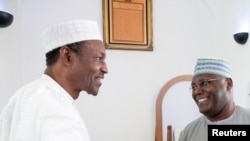Nigerian President Muhammadu Buhari swore 36 ministers into his cabinet on Wednesday, nearly six months after he was sworn in.
Until now, although the senate had approved all 36 nominees, no one knew which portfolio each of the ministers would be assigned.
Buhari won March elections after vowing to crack down on corruption in Africa's biggest economy and top oil producer. He has been criticized for waiting until September to name his ministers at a time when the economy has been hammered by the fall in oil prices.
Buhari's cabinet is smaller than that of his predecessor, Goodluck Jonathan, who had 42 ministers. Under the constitution, the president must include a member from each of the country's 36 states.
Lengthy process
Garba Shehu, senior special assistant to the president on media and publicity, told VOA last month the selection process had taken this long because President Buhari, unlike previous presidents, has high expectations of his cabinet.
Professor Kabiru Mato, director of the political science department of the University Abuja, said Nigerians are anxious to know who will occupy some of the key cabinet posts, including the finance and foreign ministries, and especially whether Buhari will make good on his plan to take over the oil ministry, which accounts for nearly 70 percent of all Nigerian government revenue but which had been plagued in the past by corruption.
“After the swearing-in, the president will now allocate responsibilities or assign each of these 36 ministers to the various ministries and departments of government that they are supposed to serve. And after the portfolios are assigned, then the president said he’s going to have his first federal executive council meeting,” he said.
Mato said Nigerians do not know which ministers are going to occupy which departments because Buhari did not submit the nominees with their assigned portfolios at their senate confirmation hearing.
As a result, Mato said, much of what Nigerians know about the portfolios has been based on speculation. Some said the cabinet is made up of many familiar faces who helped elect Buhari.
Key ministries
Among the candidates for the key ministry of finance is Okechukwu Enyinna Enelamah, a former Goldman Sachs banker who heads Nigeria's biggest private equity firm, African Capital Alliance.
Mato said the new cabinet ministers will carry big responsibilities.
“Whoever the president nominated and confirmed by the senate, it is assumed that that person is going to be an agent of change. He’s also going to play a credible role that Nigeria is no longer going to be run with business as usual where people who are appointed to lofty cabinet positions are only to serve their aggrandizement as against providing their skills and entrepreneurship and expertise in moving the nation forward,” he said.
Mato said he hopes President Buhari will make good on his suggestion that he will to take over the oil ministry.
“The president’s body language seems to suggest that he’s going to appoint a minister of state for petroleum while he sits in as overall supervisor of the petroleum sector. I think that would be a very wise decision based on the fact that he desires to put some very tight control measures in the way and manner that national resources from the sale of oil, which of course constitutes more than 80 percent of the total income of the country,” Mato said.
Some material for this report came from Reuters





